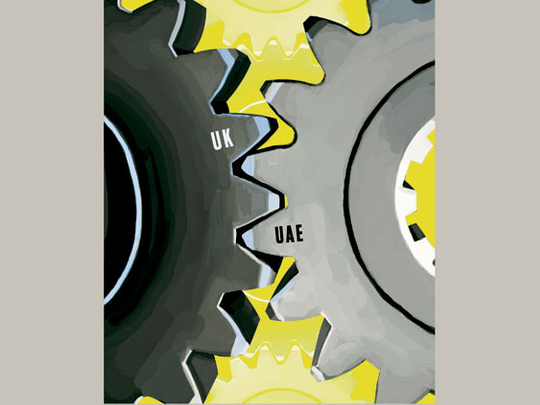
The last year has been a period of political and economic upheaval across the Gulf, Europe and indeed the world.
Despite this turbulence, however, bilateral relations between the UAE and the UK are stronger today than ever before.
In the last 18 months alone, Her Majesty The Queen, the Prime Minister and Foreign Secretary have all among others made high-profile visits to the federation. And the Duke of York travelled to the UAE late last year to help celebrate the 40th anniversary of the Union.
The City of London continues to view the UAE as a key partner and I hope that my visit this week, accompanied by a senior City business delegation from a range of different sectors, will help to strengthen ties further.
From the City's perspective, we view this relationship very much as one of sharing skills and experience to grow both financial sectors. Closer partnership will support the wider goals of economic diversification and growth.
The City has recovered from the recent global financial crisis and remains a world leading centre. Reforms undertaken over the past few years, affecting issues ranging from capital requirements to executive pay, have reinforced the stability of the system and mean the UK is uniquely placed to help the UAE grow its own financial sector.
The joint UK-UAE taskforce set up in 2010 has played a key role in reinvigorating our relationship and we have made major strides towards the goal of increasing bilateral trade to £12 billion (Dh69 billion) by 2015. Important steps towards closer cooperation have also been made in areas including defence, energy and education.
There is though, as always, scope for more to be done and UK Trade and Investment has recognised this by identifying the UAE as one of its High Growth Markets under its five-year strategy.
World-class education
Education, training and qualifications are crucial when it comes to nurturing the skills base of our people. The provision of world-class education has been central to the UK's reputation for developing and attracting the talent needed by firms operating in the global financial services industry. As Chancellor of City University, I am impressed by all that the Cass Business School in Dubai has achieved. Consistently rated as one of the world's top Business Schools, its presence in the UAE is supporting the Emiratisation drive to produce the next generation of great leaders.
City firms are actively supporting the Emiratisation process and closer collaboration with the UAE will help to boost the mutually beneficial exchange of talent, ideas and capital.
Clifford Chance and Trowers & Hamlins teamed up with Dubai Holding to launch the first-ever training programme in English law for Emiratis in 2008. Since this Herbert Smith and my own firm Allen & Overy have become actively involved in this area — together with many other UK companies. HSBC and Standard Chartered continue to make a considerable contribution to training talented Emiratis and have done throughout their long partnership with the UAE.
This is a two-way partnership and we are also keen on encouraging the UAE to think about investing further in the UK. Half the top 10 sovereign wealth funds — including the Abu Dhabi Investment Authority — have offices in London and we are glad to have them.
Our partnership has also helped secure Emirati funding for major projects such as Europe's largest wind farm, the London Array, and the UK's most ambitious port and logistics centre, the London Gateway near the mouth of the River Thames. Significant sums have also been invested — as much as it hurts me to say it as a Bradford fan — into Manchester City Football Club. Etihad Airways also chose Manchester as the location for their European centre.
Infrastructure development and overcoming potential barriers to growth is crucial to ensuring the long-term prosperity of both countries. Neither the UK nor UAE can afford to stand still while others build for the future.
In this light, the scope of programmes under the broad concept of Abu Dhabi 2030 — involving regional railways, metros, water transport and better roads — is truly astonishing.
Expertise
The City has considerable expertise in mobilising the capital needed for such large-scale development. In particular, public-private partnership (PPP) can provide a financing model that enables the UAE to lock in long-term expertise through involving the private sector in public service delivery. British companies have experience in working on such large-scale projects from design to delivery and are uniquely placed to help turn the UAE's plans into reality.
George Osborne, the UK Chancellor of the Exchequer is committed to delivering growth in the UK and helping smooth the pathway for inward investors, for the benefit of both. In the autumn he announced the creation of a new Cabinet Committee on Major Projects to assure international investors that blockages and delays to large scale projects will be focused upon from the very top of UK Government.
It is clear that the enduring UAE-UK partnership continues to benefit both sides, and I hope my visit will serve as a learning tool for practitioners to share experiences and strengthen financial ties.
Of course, we have both encountered difficulties in the wake of the global financial crisis. But financial services and trade in general are not a zero sum game: we can all be stronger if we work together to overcome the challenges of a fast-changing world.
I do not doubt that 2012 will be a year of great challenge, for London, for the UK, for the UAE and for the world. But through our continued partnership we have the capacity to transform these huge challenges into an enduring legacy for both nations.
David Wootton is Lord Mayor of the City of London.












